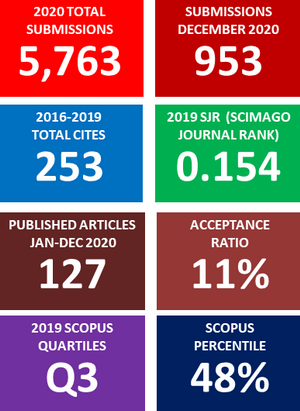Cost-benefit Assessment of Congresses, Meetings or Symposia, and Selection Criteria to Determine if They are Predatory
Keywords:
Congress, meeting or symposium (CMS), costs, predatory, scrutinyAbstract
Not a single day goes by in which academics receive one or more emails inviting them to attend a congress, meeting or symposium (CMS). Increasingly, most of these invitations are for attending CMSs that lie beyond the scope of their fields of research, and are usually characterized by images of grandeur and finesse, enticing the invitee with claims of international status, the pompous nature of the steering committee, or the meeting’s sheer size and dimension, including a list of famed participants. In other cases, emphasis is placed instead on the exotic nature of the location, and the invitation often sounds more like a travel brochure than an invitation to join a professional CMS. In several cases, a promise to publish the CMS proceedings in an indexed database is made. It is difficult to judge the veracity and significance of such meetings at a distance, even more so through an email. However, when the balance sheet is drawn up, and the costs are assessed, including of travel, accommodation and meals, it is clear to see that most CMSs are simply traps to make money, and that true academic discovery is a secondary, or more distant, objective. This article draws readers’ attention to the need for making a cost-benefit analysis based on the criteria that we present before deciding on whether to attend a CMS, or not.Downloads
Metrics
References
JA Teixeira da Silva and AR Memon. CiteScore: A cite for sore eyes, or a valuable, transparent metric? Scientometrics 2017, DOI: 10.1007/s11192-017-2250-0.
G Sharrock. Communicating spending cuts: Lessons for Australian university leaders. J. Higher Ed. Policy Man. 2014; 36, 338-54.
S Sorooshian. Publication phishing: A growing challenge for researchers and scientific societies. Curr. Sci. 2016; 110, 766-7.
M Schulte. Toot your own horn! Share your successes through publication, conferences, awards, and professional development. J. Cont. Higher Ed. 2016; 64, 133-6.
S Sorooshian. Conference wolves in sheep’s clothing. Sci. Eng. Ethics 2017, DOI: 10.1007/s11948-016-9788-8.
J McCrostie. Warning: Conmen and shameless scholars operate in this area. Available at: https://www.timeshighereducation.com/comment/warning-conmen-and-shameless-scholars-operate-area, accessed February 2017.
JD Bowman. Predatory publishing, questionable peer review, and fraudulent conferences. Amer. J. Pharm. Ed. 2014; 78, 176.
RW Byard. The forensic implications of predatory publishing. Forensic Sci. Med. Pathol. 2016; 12, 391-3.
M Brooks. Red-flag conferences. Chronicle Higher Ed. 2009. Available at: https://chronicle.com/article/Red-Flag-Conferences/44795, accessed February 2017.
JA Teixeira da Silva. Are international symposia becoming redundant and elitist? Asian Australas. J. Plant Sci. Biotechnol. 2013; 7, 114-5.
S Sorooshian. Scholarly black market. Sci. Eng. Ethics 2017, DOI: 10.1007/s11948-016-9765-2.
B Kulamer, W Meester, J Salk, N Blair-DeLeon, G MacPherson, W Moses, A Philippidis, C Chapman, D Smith, I Stoneham and K Vukmirovic. Recommended practices to ensure technical conference content quality. Available at: https://www.ieee.org/conferences_events/conferences/ publishing/paper_acceptance_criteria.pdf, accessed February 2017.
RV Noorden. Publishers withdraw more than 120 gibberish papers. Nature 2014, DOI: 10.1038/nature.2014.14763.
A McCook. One publisher appears to have retracted thousands of meeting abstracts. Yes, thousands. Available at: http://retractionwatch.com/2015/06/25/one-publisher-appears-to-have-retracted-thousands-of-meeting-abstracts-yes-thousands, accessed February 2017.
JA Teixeira da Silva. On the abuse of online submission systems, fake peer reviews and editor-created accounts. Persona Bioética 2016; 20, 151-8.
E Hunt. Nonsense paper written by iOS autocomplete accepted for conference. Available at: https://www.theguardian.com/science/2016/oct/22/nonsense-paper-written-by-ios-autocomplete-accepted-for-conference, accessed February 2017.
A Al-Khatib and JA Teixeira da Silva. Stings, hoaxes and irony breach the trust inherent in scientific publishing. Publishing Res. Quart. 2016; 32, 208-19.
JA Teixeira da Silva and A Al-Khatib. The macro and micro scale of open access predation. Publishing Res. Quart. 2017. DOI: 10.1007/s12109-016-9495-y.
G MacPherson. Recommended practices to ensure conference content quality. Res. Integrity Peer Rev. 2016; 1, P8.
Downloads
Published
How to Cite
Issue
Section
License
Copyright (c) 2017 Walailak Journal of Science and Technology (WJST)

This work is licensed under a Creative Commons Attribution-NonCommercial-NoDerivatives 4.0 International License.









